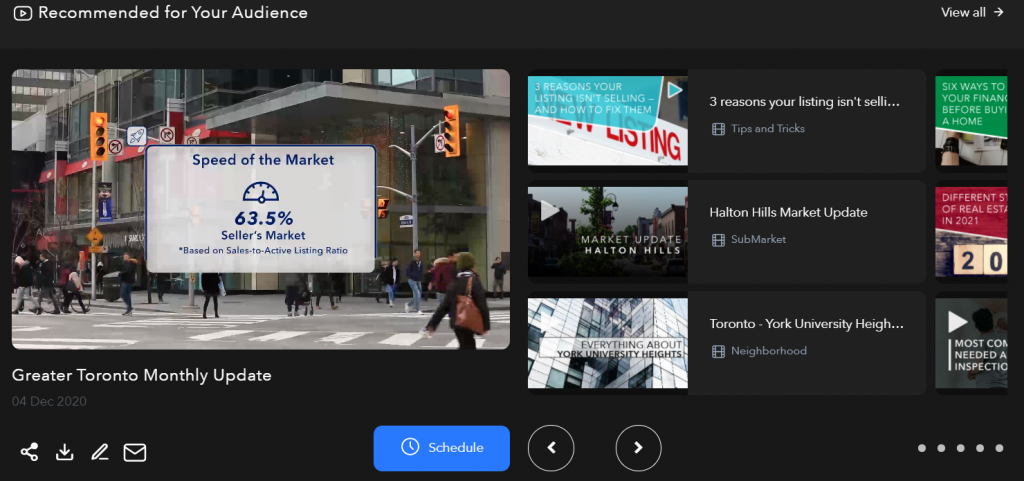Being a real estate agent is already a tough job. With so many agents in the market, competition is fierce. Agents must do their best to win market share.
However, in today’s market, traditional direct marketing strategies are less effective. Hard-earned cash is spent on Facebook and Google ads, yielding little return. The ROI of direct marketing strategies is increasingly unsatisfactory.
This decline doesn’t appear to be a one-time issue. A meaningful trend seems to be emerging: the audience is overwhelmed with too many marketing messages.
They’ve started ignoring repetitive, uninspiring ads. It’s frustrating, especially for new agents lacking the advantages of word-of-mouth and referrals. Yet, repeating old strategies won’t fix the problem.
To turn this around, agents should think from the audience’s perspective.
The Root of the Problem: Bad Content
Real estate, like any business, is flooded with repetitive marketing messages. Most agents claim to be the best but offer the same content.
A quick glance at social media and Google ads reveals most ads focus on agents themselves. Few consider what clients truly need.
In 1996, Bill Gates said, “Content is king.” He saw the internet’s potential early on, predicting content would be its foundation. Today, content indeed reigns. Audiences are tired of ads offering nothing new. Content is the key to standing out. But creating content isn’t enough creating great content is what matters.
What is great content? Simply put, it’s what your audience is searching for. It addresses their needs and concerns.
Real estate can be complex for homebuyers and sellers. They have questions and want expert guidance. Agents who address these concerns become the trusted go-to experts.
Videos, Videos, Videos
We can’t stress this enough. Watching videos is easier than ever thanks to faster internet speeds.
Millions of videos are shared daily across platforms like Facebook, Instagram, and Twitter. YouTube, the largest video platform, makes watching content effortlessly.
But creating videos is harder than watching them. The valuable content mentioned earlier is best delivered in video form. Is a bad video better than none?
Absolutely not. In real estate, reputation and brand image are delicate. Poor-quality videos can do more harm than good.
roomvu market update videos
Since video production is challenging, many agents avoid it altogether. But this means missing out on significant benefits.
With a little research, agents can find tips for creating their own videos or ideas for content. Hiring a professional real estate video creator is another option. Though it may seem like an extra expense, the ROI is worth every penny.
roomvu neighborhood bio videos
Social Media, Automated
Social media is one of the best channels for generating real estate leads. Features like Instagram Live help agents connect with larger audiences.
If you have the time, skill, and patience to manage several social media accounts, then go for it. But most agents, with their busy schedules, struggle to do so.
Success on social media requires consistency and engaging in valuable content. Many agents shy away from it due to a lack of time, skills, or content.
Yet, they can still reap the benefits by using automation tools. Platforms like Roomvu offer social media automation services, including content creation and scheduling.
Roomvu’s service does all the heavy lifting, even providing a free content calendar. Agents simply connect their accounts, choose the right content from Roomvu’s content factory, and let the automation handle the rest.
roomvu social media calendar
Get Creative with Your Marketing Content
Marketing in real estate doesn’t have to be boring or repetitive. Instead of focusing on your achievements and credentials, dive into content that matters to your audience.
Share tips for first-time homebuyers, discuss market trends or answer common questions people have.
Clients aren’t looking for just another agent—they’re looking for a guide they can trust.
Agents who focus on educational content become resources clients naturally turn to.
When you regularly offer valuable insights, clients see you as more than a salesperson—they see you as a trusted advisor.
A key tip here is to mix up your content style. Don’t just rely on blogs or posts; experiment with infographics, podcasts, and especially videos.
Build Relationships, Not Just Sales Pitches
Social media is a fantastic tool for connecting with potential clients. But it’s not about blasting listings or boasting about recent sales. It’s about engagement as well!
Whenever you get time, reply to comments, answer questions in DMs, and participate in discussions. After all, the goal is to build relationships, not just push sales.
Automation tools can help keep your content consistent, but don’t let them make your approach robotic.
Take time to interact personally whenever possible. Even if it’s just a quick response to a comment, it shows you’re approachable and genuine. People want to work with agents who care, not those who just see them as numbers.
The Power of Consistency and Patience
Real estate success rarely happens overnight. Building a brand, growing a following, and gaining trust takes time.
Consistency is everything. Keep posting, keep sharing values, and keep interacting with your audience. Don’t get discouraged if the results aren’t immediate. The key is to stay persistent.
Creating great content regularly might feel overwhelming, but it’s worth the effort. The agents who succeed are the ones who stick with it, even when it feels like no one’s paying attention.
Final Words
Agents can’t afford to stick to outdated methods. Traditional direct marketing strategies are failing because they lack value.
People no longer click on ads that only make empty claims. The problem isn’t advertising itself—it’s the lack of valuable content.
Agents should adopt a fresh approach to marketing. Focus on being a helpful expert who shares useful information.
Address your audience’s needs and concerns with insightful, valuable content, preferably in video form. This strategy requires patience and consistency, as building a community takes time.
Success in real estate’s competitive market comes from putting customers first. Understand their needs and concerns rather than just promoting yourself as the best agent.
Read Also:
- Best Transaction Management Software for Your Real Estate Business
- 8 Social Media Tips for Your Business
- How to Start Social Media Agency in India
- 5 Easy Estate Planning Tips to Help You Plan for the Future



























